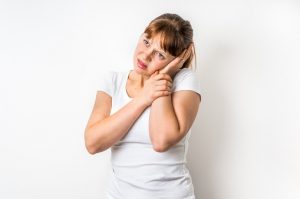
The Sichuan research team used prior research and the traditional Chinese medicine (TCM) theory for the basis of their electroacupuncture clinical protocol. These references identify a specific acupuncture point important for the treatment of tinnitus (point Tinggong (SI19)). Researchers included this area in the study, as the TCM finds it benefits the ears, reduces tinnitus, and improves conduction in the auditory nerves. Electroacupuncture creates rhythmic contractions of the muscles in the region of the ear to promote circulation and subsequent delivery of nutrients to the hearing system.
Tinnitus is categorized as either excess type or deficiency type, according to the Sichuan researchers. Excess type is often exacerbated by anger, anxiety, and panic, and is thought to be related to liver and gallbladder inflammation. Deficiency related tinnitus is thought to be caused by kidney or liver deficiency. Abnormalities in these organs are said to be the cause of various forms of tinnitus, with the acupuncture channels for each respected organ providing relief.
Two acupuncture groups were compared in this clinical study. One group received electroacupuncture stimulation and the other received manual acupuncture stimulation using reducing and reinforcing techniques.
Primary and secondary acupuncture points were chosen to best target the channels connected to possible tinnitus. Treatment was applied once per day for 15 days to complete one course of care. A total of two-to-three courses were applied using this protocol and they all achieved the aforementioned results.
Other researchers from the Central Hospital of Otolaryngology and Head and Neck Surgery in Chaoyang City did similar studies, but using a different protocol of acupuncture points, achieving an 80 percent total effectiveness rate.
The overall statistics demonstrate important patient outcomes across various studies, including the ones noted for the treatment of tinnitus through acupuncture. They saw that 64.17 percent of all patients fully recovered, 14.71 percent had significant improvement, 11.76 percent had a slight improvement, and 8.82 percent had no improvement. The total effectiveness rate was 91.18 percent across all patients in the various related studies.
Related: Tinnitus treatment: Therapies and exercises to manage ringing in the ears